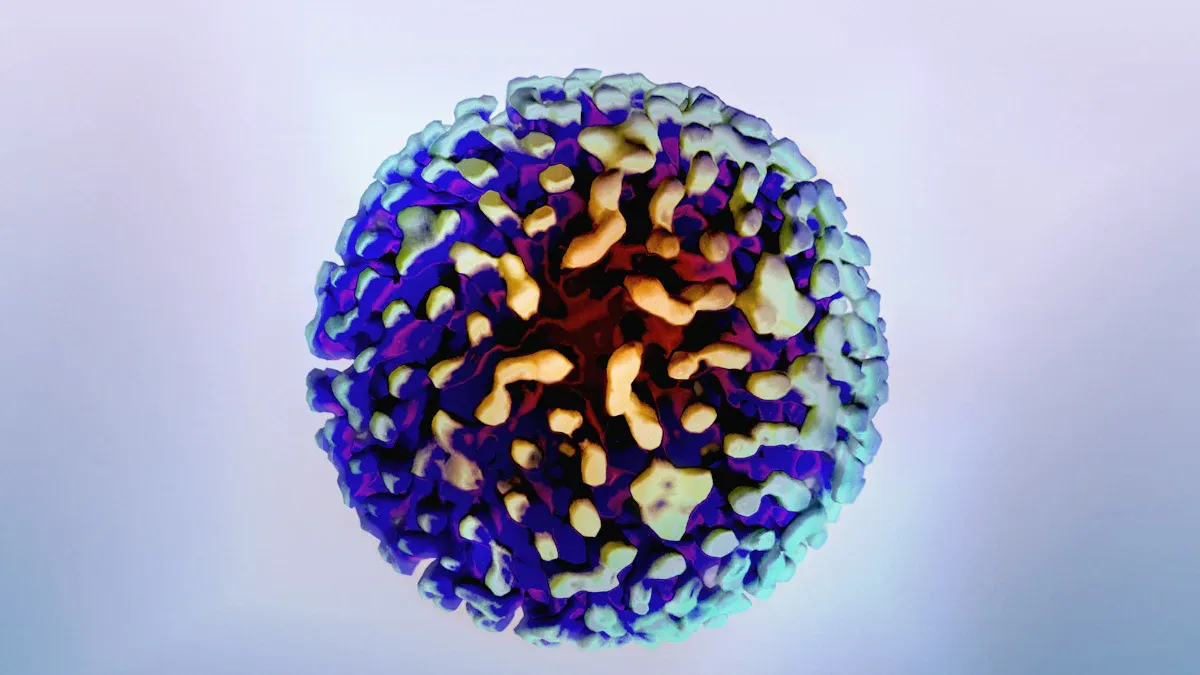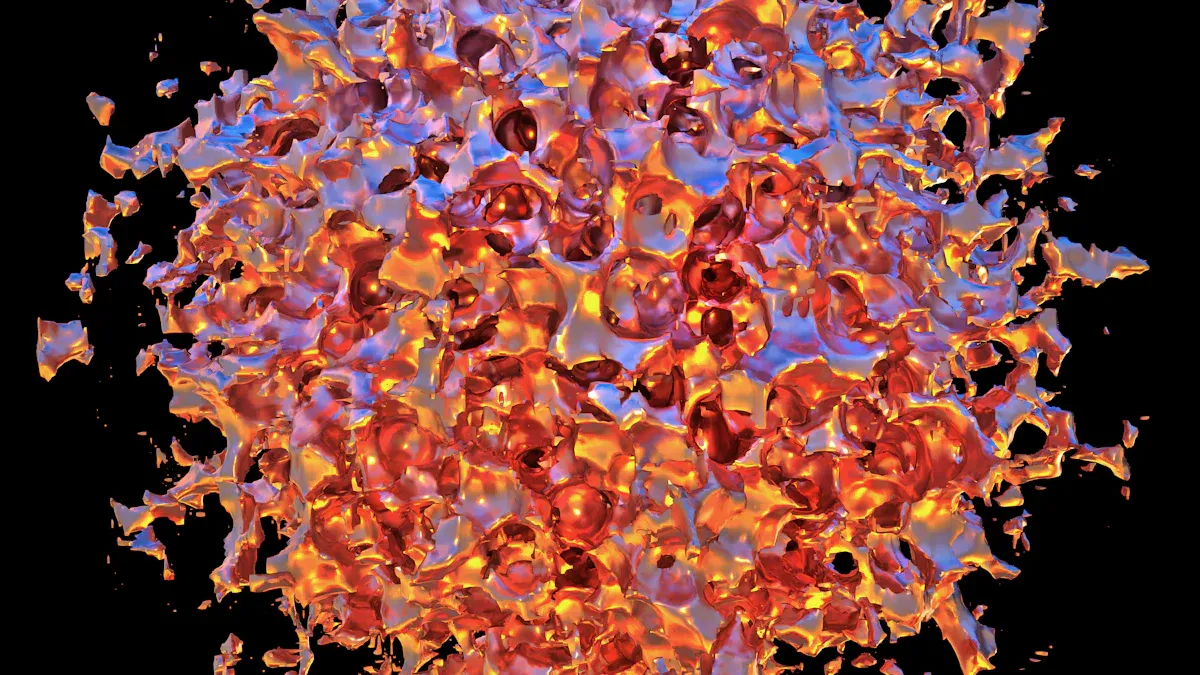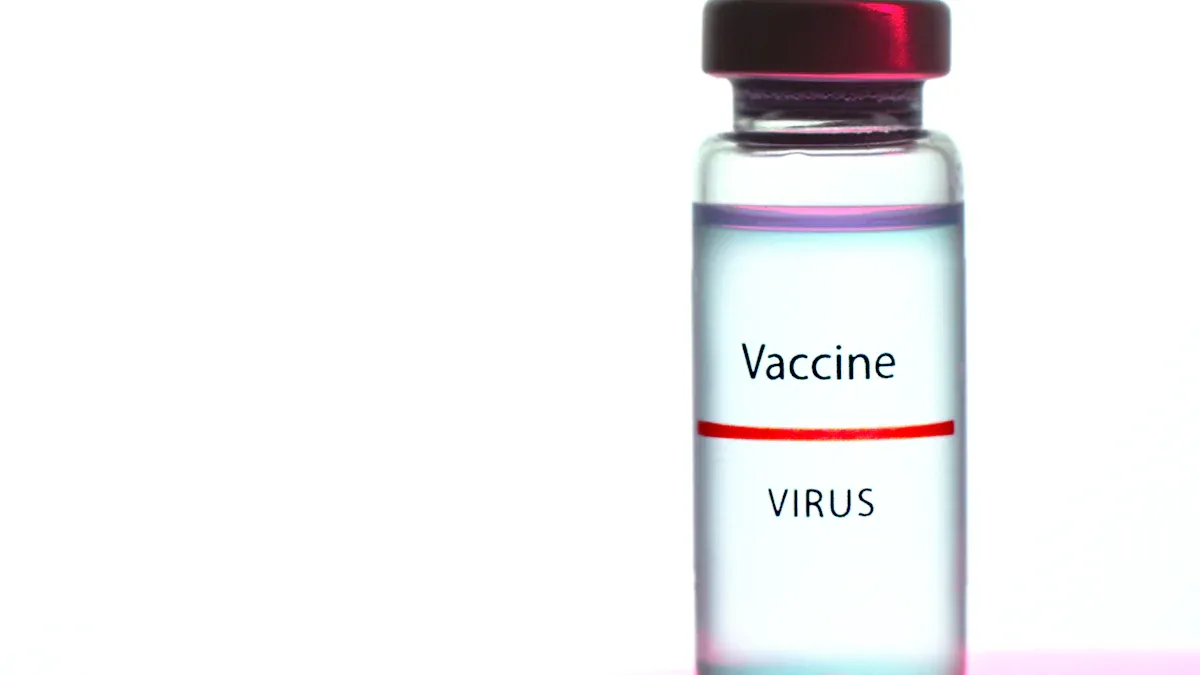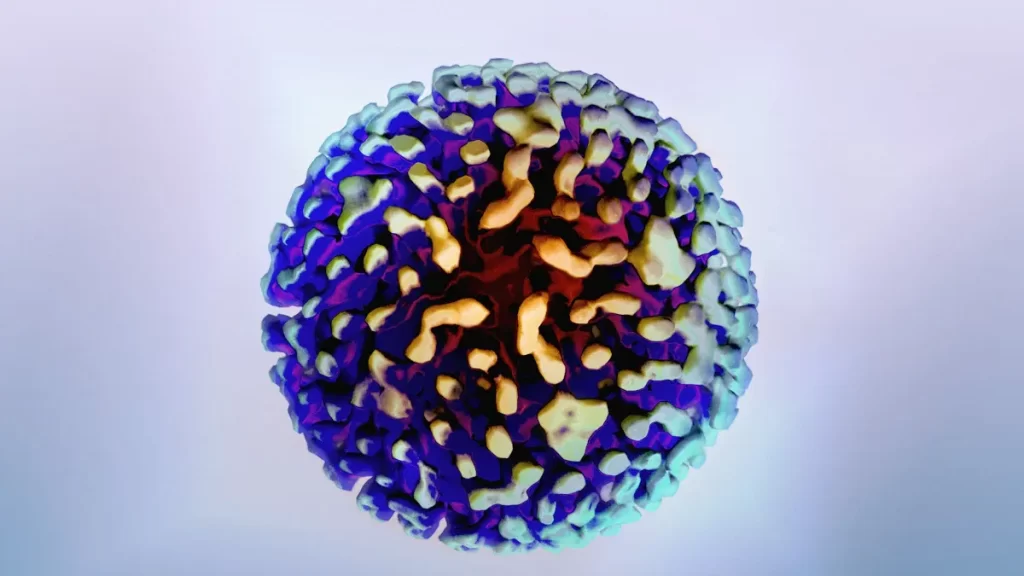News & Events
Hepatitis B Surface Antibody Reactive Results and Their Immunity Implications

If you see a hepatitis b surface antibody reactive result, you likely have protection against hepatitis B. You may have gained this immunity from a vaccine or a past infection. Your anti-HBs level helps show how strong your protection is. Health experts say a level of 10 mIU/mL or higher means you are protected. If your level drops below 100 mIU/mL, a booster shot may help.
| Anti-HBs Level | Protection Status |
|---|---|
| 10 mIU/mL or more | Protected after three vaccine doses |
| <100 mIU/mL | Booster vaccination recommended |
Key Takeaways
- A reactive hepatitis B surface antibody result indicates you have immunity against hepatitis B, either from vaccination or a past infection.
- Maintain an anti-HBs level of 10 mIU/mL or higher for strong protection. If it drops below 100 mIU/mL, consider getting a booster shot.
- Regular hepatitis B testing is crucial for early detection and monitoring your immunity status. Consult your healthcare provider for personalized advice.
- Most people do not need booster shots after successful vaccination, as long-term immunity is common. Your immune system can still protect you even if antibody levels decrease.
- Understanding your test results is important. A reactive anti-HBs means you are not at risk for hepatitis B infection, so stay informed and confident about your health.
Hepatitis B Overview

What Is Hepatitis B?
You may hear about hepatitis b often, but what does it mean? Hepatitis b is a liver disease caused by the hepatitis b virus. This virus attacks your liver and can lead to serious health problems. You can get hepatitis b through contact with infected blood or body fluids. Sexual transmission is also possible. The risk of chronic hepatitis b infection is higher for babies and young children. In some regions, mother-to-child transmission is the main route.
Today, hepatitis b affects millions of people worldwide.
- The global prevalence of chronic hepatitis b infection dropped by about 31% from 1990 to 2019.
- In 2019, around 316 million people had chronic hepatitis b, which is about 4.1% of the world’s population.
- Among infants and children under 5, the rate is only 1%, showing a big decrease since 1990.
Hepatitis b can cause cirrhosis and liver cancer. Each year, about 887,000 people die from complications related to hepatitis b. Universal vaccination programs have helped lower new infections, especially in places like Taiwan and China.
Tip: Vaccination is the best way to protect yourself and your family from hepatitis b infection.
Hepatitis B Test Types
If you want to know your hepatitis b status, hepatitis b testing is important. Hepatitis b serology uses several tests to check for hepatitis b markers in your blood. Each test looks for something different. Here is a table to help you understand the main hepatitis b test types:
| Test Type | Measures | Significance |
|---|---|---|
| Hepatitis B surface antigen (HBsAg) | Presence of HBV surface antigen | Shows active hepatitis b infection and risk of spreading the virus |
| Hepatitis B surface antibody (anti-HBs) | Levels of antibodies from vaccination or past infection | Tells you if you have immunity to hepatitis b |
| Hepatitis B core antibody (anti-HBc) | Antibodies against HBV core antigen | Suggests current or past hepatitis b infection, used with other hepatitis b markers |
| Hepatitis B e antigen (HBeAg) | Amount of HBeAg in blood | Indicates high hepatitis b virus replication and increased infectivity |
| Hepatitis B viral load test | Amount of HBV DNA in blood | High levels mean severe hepatitis b infection and higher transmission risk |
You may need more than one hepatitis b test to get a full picture of your hepatitis b serology. Testing helps your doctor decide if you need treatment or if you are protected. Hepatitis b serology is also used to monitor your response to vaccination.
Note: Regular hepatitis b testing is key for early detection and prevention.
Hepatitis B Surface Antibody Reactive Meaning
What Does Reactive Mean?
When you see a hepatitis b surface antibody reactive result, you can feel confident about your protection. This result means your body has made anti-hbs, a special antibody that fights the hepatitis b virus. You get this antibody after a successful vaccination or if you recover from a past hepatitis b infection. The presence of anti-hbs shows immunity and keeps you safe from getting hepatitis b again.
- A hepatitis b surface antibody reactive result means:
- You have immunity against hepatitis b.
- You gained this protection from vaccination or a past infection.
- You are not at risk for a new hepatitis b infection.
- The reactive hep b surface antibody gives you peace of mind about your health.
Doctors use the reactive hep b surface antibody to confirm your immunity status. If you see this result, you do not need to worry about catching hepatitis b from others. The reactive test indicates past infection or successful vaccination, both leading to strong protection.
Anti-HBs and Immunity
Your anti-hbs level tells you how strong your immunity is. Doctors measure this antibody in international units per liter (IU/L). The higher your anti-hbs, the better your protection. You can check the table below to see what your anti-hbs level means for your health:
| Anti-HBs Level (IU/L) | Correlation with Immunity | Recommendation |
|---|---|---|
| ≥ 2 | Predictive of protective immune response | Sufficient for response after booster |
| < 10 | Does not indicate loss of immunity | Booster may not be required in some cases |
| < 3 | Booster dose required | – |
If your anti-hbs is 2 IU/L or higher, you have a good immune response. Levels below 10 IU/L do not always mean you lost immunity, but your doctor may check again or suggest a booster. If your anti-hbs drops below 3 IU/L, you may need another vaccine dose. The reactive hep b surface antibody helps guide your next steps and confirms your immunity.
You should know that anti-hbs is the main marker for immunity confirmation. Doctors look for this antibody to decide if you need more vaccination or if you are already protected. The reactive hep b surface antibody result gives you clear information about your immune status.
Reactive Hep B Surface Antibody vs. Other Markers
You may see other hepatitis b test results along with your reactive hep b surface antibody. Each marker tells a different story about your health. The table below explains what each marker means for your diagnosis:
| Marker | Clinical Significance |
|---|---|
| Anti-HBs | Indicates immunity against hepatitis b, either from vaccination or recovery from past infection. |
| HBsAg | Suggests active infection; a reactive result indicates the virus is present and the person is infectious. |
| Anti-HBc | Indicates past infection; a reactive result shows that the individual has been exposed to the virus. |
| HBeAg | Indicates active viral replication; a reactive result means high infectivity. |
| Anti-HBe | Suggests a decrease in viral replication; a reactive result indicates the body is controlling the virus. |
| HBV DNA | Measures active viral replication; a reactive result indicates the virus is reproducing in the body. |
| Immunity from Vaccination | Identified when only anti-hbs is reactive, with all other markers non-reactive, indicating protection from vaccination. |
If you only have a reactive hep b surface antibody and all other markers are negative, you have protection from vaccination. If you see both anti-hbs and anti-hbc as reactive, you likely had a past infection and now have immunity. The anti-hepatitis b surface antibody is the key marker for immunity confirmation, while other markers help with diagnosis and show if you have an active infection or past exposure.
Doctors use these markers together to make a full diagnosis. The reactive hep b surface antibody result stands out because its presence shows immunity. Other markers, like hbsag or hbeag, point to active infection or high virus levels. Your doctor will explain your results and help you understand what each marker means for your health.
Note: Always talk to your doctor if you have questions about your hepatitis b test results. The reactive hep b surface antibody gives you important information about your immunity and next steps.
Immunity and Protection

Immunity from Vaccination
You gain strong protection from hepatitis b through vaccination. After you finish the full vaccination series, your body creates a special antibody called anti-HBs. This antibody helps you fight off hepatitis b if you ever come into contact with the virus. Most people who complete vaccination against hepatitis b develop a reactive hepatitis b surface antibody result. This means your immune system responded well to the vaccine.
- About 96% of people who get vaccinated have protective antibody levels within ten years.
- Studies show that 88% to 100% of people reach protective levels after successful vaccination.
- Most people (85%) have antibody titres above 100 mIU/ml, while 11% have titres between 10-100 mIU/ml. Only a small group (3.5%) have titres at or below 10 mIU/ml.
You can see that almost everyone who gets the full hepatitis b vaccination series develops a reactive result. This shows that your body has built up immunity from vaccination. If you work in healthcare or belong to a high-risk group, your doctor may check your antibody levels to make sure you stay protected. For most people, you do not need to measure your anti-HBs after successful vaccination.
Tip: If you have a reactive hepatitis b surface antibody result after vaccination, you have strong protection against hepatitis b infection.
Immunity from Past Infection
You can also develop immunity if you recover from a past hepatitis b infection. Your body makes antibodies to fight the virus, and these antibodies stay in your blood. If you have both anti-HBs and anti-HBc reactive, this means you had an infection before and now have protection.
Research shows that about 58.3% of people keep protective anti-HBs levels eight years after infection. Even if your antibody level drops below 10 mIU/mL, you may still have immunity. Your immune system remembers how to fight hepatitis b, even if the antibody is hard to detect. Children who recover from hepatitis b infection also keep this protection, even when their antibody levels fall.
Immunity from past infection can fade over time as antibody levels go down. You may become more likely to get hepatitis b again if your antibody drops too low. Vaccine-induced immunity works differently. After successful vaccination, your body creates immunologic memory. This memory helps you make more antibody quickly if you ever face the virus again. Studies show that people who get the vaccine keep effective immunity for years, even if their antibody level falls below the test limit.
Long-Term Protection
You want to know how long your protection lasts after a reactive hepatitis b surface antibody result. The good news is that both vaccination and past infection can give you long-term protection. Studies show that hepatitis b vaccination can protect you for up to 20 years or more. Some people keep cellular immunity for 32 years after vaccination, even if their antibody level drops. When given a booster dose, 88% of people respond with a strong antibody increase, even after 30 years.
| Study | Duration of Protection | Notes |
|---|---|---|
| Poovorawan et al. | Up to 20 years | Long-term persistence of antibodies and immune memory in infants |
| Doi et al. | 32 years | Evidence of long-lasting cellular immunity despite low antibody levels |
| Booster Response | 30 years | 88% response to booster at 30 days |
Most people do not need booster doses after successful vaccination. Guidelines say that booster shots are only needed for high-risk groups, such as healthcare workers. If you are healthy, you do not need to check your antibody level or get extra shots after the full vaccination series.
| Study | Percentage of Long-term Immunity | Booster Dose Response |
|---|---|---|
| Italian adolescents | 91.2% | 91.7% showed vigorous response |
| Study (Follow-up) | Immunological Memory Persistence | Booster Dose Necessity |
|---|---|---|
| 18-19 years | Yes | Not needed for general population |
Several factors can affect how long your hepatitis b immunity lasts. The timing of your vaccination doses matters. If you delay your first or third dose by a month, your antibody level may be lower. Babies who get vaccinated earlier have higher antibody levels than those vaccinated later. The type of vaccine and your age can also change how long your protection lasts.
| Factor | Impact on Immunity |
|---|---|
| Timing of vaccination doses | A one-month delay in first and third dose increases risk of lower antibody titres. |
| Age at first vaccination | Infants vaccinated earlier have higher antibody levels. |
| Vaccine immunogenicity | Varies based on timing and age, affecting long-term protection. |
Note: If you have a reactive hepatitis b surface antibody result after successful vaccination, you can feel confident about your long-term protection. Most people do not need extra testing or booster shots.
Next Steps After a Reactive Result
Consulting Your Healthcare Provider
You should talk to your healthcare provider after you receive a hepatitis b surface antibody reactive result. Your doctor can help you understand what this result means for your health. If you see other positive hepatitis b markers, such as hepatitis b core antibody or hepatitis b surface antigen, you may need more tests. Your provider will check for signs of hepatitis infection or risk of reactivation. Early screening helps your doctor start treatment quickly if needed and lowers the chance of liver problems.
- You should consult your healthcare provider if:
- You have a reactive hepatitis b surface antibody result and other hepatitis b markers are also positive.
- You have a history of hepatitis infection or symptoms like fatigue, yellow skin, or stomach pain.
- You need advice about hepatitis b vaccination or booster shots.
- You have questions about your risk for hepatitis infection.
Your provider plays a key role in explaining your hepatitis b test results. They use a non-judgmental approach and help you feel comfortable discussing your health. They may refer you to a specialist if you need ongoing care for hepatitis infection.
Monitoring Anti-HBs Levels
You may wonder if you need to check your antibody levels again. Most people with a reactive result and no other hepatitis b markers do not need further testing. If you belong to a high-risk group, such as healthcare workers or people with weak immune systems, your doctor may suggest regular monitoring. For those at lower risk, doctors recommend checking hepatitis b DNA and liver enzymes every 1 to 3 months instead of frequent antibody tests.
- Monitoring is important if:
- You are at risk for hepatitis b exposure at work or home.
- You have a history of hepatitis infection.
- You do not receive antiviral medicine but need close follow-up.
Remember, lab tests for hepatitis b antibodies are quick and easy, but they do not always show your full immunity. Your body can still protect you from infection even if your antibody level drops over time.
Follow-Up Actions
After a hepatitis b surface antibody reactive result, you can feel reassured about your protection. Most people with this result need no further vaccination needed. If you have only the hepatitis b surface antibody reactive and no other positive markers, you have strong protection against hepatitis infection. You can safely attend school, travel, or work without restrictions. The CDC states that hepatitis b infection does not prevent you from joining health professions or medical training.
- Common misconceptions include:
- Thinking a reactive result always means you had an infection. In fact, it often shows protection from vaccination.
- Believing you need more shots if your antibody level drops. Your immune system remembers how to fight hepatitis b, even if the antibody is low.
- Worrying about stigma or discrimination. You have the right to seek help and support if you face unfair treatment.
Tip: If you feel anxious or worried about your hepatitis b result, talk to your doctor or a support group. You are not alone, and many people share your concerns.
A hepatitis b surface antibody reactive result usually means you have developed immunity. You may have gained this protection from vaccination or after recovering from hepatitis b.
- This result shows your body has made antibodies that help prevent future hepatitis b infections.
- Healthcare workers with high anti-HBs levels often keep protection for many years, and most people respond well to booster doses if needed.
- The CDC and WHO recommend early vaccination, especially for infants, to help control hepatitis b worldwide.
| Anti-HBs Level | Protection Status |
|---|---|
| High | Long-term immunity |
| Low | Booster may help |
You should talk to your healthcare provider to understand your result and decide if you need more testing or a booster. You can feel confident about your long-term protection.
FAQ
What does a hepatitis B surface antibody reactive result mean?
You have protection against hepatitis B. This result shows your body made antibodies after vaccination or past infection. You do not have an active hepatitis B infection.
Do I need a booster shot if my anti-HBs level drops?
If your anti-HBs level falls below 10 mIU/mL, your doctor may suggest a booster. Most people keep immunity for years, even if levels decrease.
Can I get hepatitis B again if I have a reactive result?
You have strong protection. Reinfection is rare. Your immune system remembers how to fight the virus, even if your antibody level drops.
Should I worry if only my anti-HBs is reactive?
No need to worry. A reactive anti-HBs alone means you gained immunity from vaccination. You do not have hepatitis B or risk spreading it.
How often should I check my anti-HBs levels?
Healthcare workers or people at high risk may check levels every few years. Most people do not need regular testing after full vaccination.

